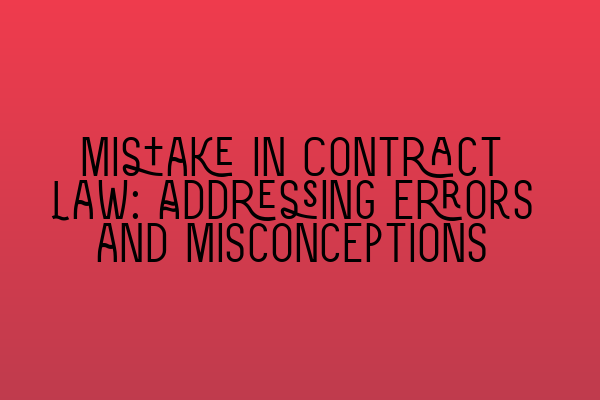Mistake in Contract Law: Addressing Errors and Misconceptions
In contract law, mistakes can happen that may alter the terms and conditions of an agreement. These mistakes can lead to disputes and legal complications if not addressed properly. Therefore, it is crucial for solicitors and legal professionals to have a clear understanding of mistake in contract law and how it can be rectified. In this article, we will delve into the concept of mistake in contract law and discuss common errors and misconceptions that often arise in this area.
What is a Mistake in Contract Law?
A mistake in contract law refers to an erroneous belief or understanding by one or both parties involved in a contract. This mistake can be about a fact, a term, or a basic assumption upon which the contract is drafted. When a mistake affects a fundamental element of the agreement, it has the potential to render the contract void or voidable.
Types of Mistakes in Contract Law
There are three main types of mistakes that can occur in contract law: unilateral mistake, mutual mistake, and mistake by the other party. Let’s take a closer look at each type.
Unilateral Mistake:
A unilateral mistake occurs when only one party is mistaken about a material term or fact in the contract. This type of mistake does not typically invalidate the entire contract but may provide grounds for the mistaken party to seek relief or remedy.
Mutual Mistake:
A mutual mistake arises when both parties are mistaken about the same material term or fact in the contract. In such cases, the contract may be deemed voidable as both parties did not have a true meeting of the minds. However, certain conditions must be met for a mutual mistake to give rise to a valid claim.
Mistake by the Other Party:
This type of mistake occurs when one party intentionally or negligently induces the other party into making a mistake. In such situations, the innocent party may seek remedies such as rescission of the contract or damages.
Addressing Mistakes in Contract Law
When a mistake is identified in a contract, it is crucial to address it promptly and appropriately to minimize legal risks and potential disputes. Here are some steps to consider:
1. Identify the type of mistake:
Determine whether the mistake is unilateral, mutual, or caused by the other party. This will help in understanding the implications and potential remedies available.
2. Review the contract:
Thoroughly review the contract to identify the specific term or fact that has been mistaken. Pay careful attention to any representations, warranties, or conditions that may have been misrepresented or misunderstood.
3. Seek legal advice:
Engage with a solicitor or legal expert who specializes in contract law to navigate the complexities involved. They can provide guidance on the potential legal remedies available and the best course of action to take.
4. Communicate with the other party:
Open lines of communication with the other party to discuss the mistake and explore possible solutions. It is essential to maintain a professional and cooperative approach throughout the process.
5. Negotiate or amend the contract:
If both parties are willing, negotiate the terms of the contract to rectify the mistake and ensure that the agreement aligns with the true intentions of both parties. Amendments or supplemental agreements may be necessary to address the error appropriately.
Common Errors and Misconceptions in Mistake Law
While addressing mistakes in contract law, it is important to be aware of common errors and misconceptions that often arise. By understanding these misconceptions, solicitors can effectively guide their clients and avoid unnecessary complications. Here are a few key misconceptions to be mindful of:
1. Mistake vs. Misrepresentation:
Many individuals confuse mistakes with misrepresentations. While both can void or invalidate a contract, they arise from different circumstances and have distinct legal implications. Mistakes are based on erroneous beliefs or understandings, whereas misrepresentations involve false statements or acts.
2. Immaterial Mistake:
Some parties may mistakenly believe that an immaterial mistake is sufficient grounds for avoidance or rescission of a contract. However, for a mistake to render a contract voidable, it must relate to a material term or fact that influenced the parties’ consent.
3. Mutual Mistake Remedies:
Another misconception is that a mutual mistake automatically voids a contract. While a mutual mistake may provide grounds for voiding a contract, certain conditions must be met, such as the mistake significantly altering the agreed-upon terms or defeating the underlying purpose of the contract.
Conclusion
Mistakes in contract law can be complex and may have significant legal consequences if not addressed correctly. By understanding the different types of mistakes, following the appropriate steps to address them, and being aware of common errors and misconceptions, solicitors can effectively guide their clients and protect their interests.
To enhance your understanding of contract law and prepare for the SQE exam, practice is key. Check out our SQE 1 Practice Exam Questions and SQE 1 Practice Mocks FLK1 FLK2 to sharpen your skills. Additionally, for comprehensive preparation, explore our SQE 1 Preparation Courses and SQE 2 Preparation Courses.
Keep abreast of important exam dates by visiting our SRA SQE Exam Dates page. We wish you success in your contract law journey and future legal endeavors.
